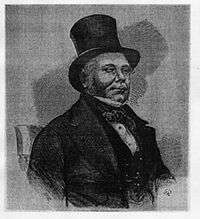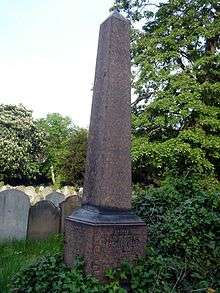Charles Frederick Field
Charles Frederick Field (1805–27 September 1874)[1][2] was a British police officer with Scotland Yard and, following his retirement, a private detective.[3] Field is perhaps best known as the basis for Inspector Bucket in Charles Dickens's novel Bleak House.[1]
Charles Frederick Field | |
|---|---|
 Field in an 1855 engraving. | |
| Born | 1805 |
| Died | 1874 |
| Occupation | police officer private detective |
Career
Field had hoped to become an actor, but his impoverished circumstances led him to join the Metropolitan Police on its establishment in 1829.[4][5] Entering as a sergeant with the E Division, he soon moved on to L Division and later the Woolwich Dockyards as an inspector. Around 1846 he joined the Detective Branch (on the retirement of Shackell), and retired as its chief in 1852.[6]

Charles Dickens had a particular fascination in the development of the police force in London and would occasionally accompany police constables on their nightly rounds. Through this, Field and Dickens became good friends, and in 1851 Dickens wrote the short essay On Duty with Inspector Field about Field and his work. Field was almost certainly the model for Inspector Bucket in Bleak House, and the parallel was drawn by contemporaries–so much so that Dickens wrote in to The Times to comment on the rumours, without actually denying them.[7] There is also some suggestion that R. D. Blackmore may have based Inspector John Cutting, who appears the novel Clara Vaughan, on Field.[1]
In addition to these fictionalized portrayals, Field was frequently lionized by the press. In 1850 Dickens wrote three articles for the journal Household Words in which he told stories of the adventures and exploits of the new detectives.[8] With these articles he supplied character sketches of the detectives, with only the names changed. He gives us this description of Field:
...a middle-aged man of a portly presence, with a large, moist, knowing eye, a husky voice, and a habit of emphasising his conversation by the air of a corpulent fore-finger, which is constantly in juxta-position with his eyes or nose.[9]
Later life
After his retirement, Field was in the press again, appearing in a 2 February 1856 supplement of the Illustrated News of the World, which was devoted to the trial of Dr Palmer of Rugeley, accused of poisoning three people. Although retired, the supplement described Field as "Inspector Field," implying that he was still active in the force. It also carried a memoir of his career. Field's actual involvement in the case was limited to a prior investigation of Palmer's financial activities, and he was not called to testify. Field's repeated use of his rank after his retirement, in his capacity as a private detective, caused consternation in official quarters, leading to at least two investigations of his conduct and a four-month stoppage of his pension in 1861. In 1865 Sir George Grey, the Liberal Home Secretary, dismissed the matter, as Field had finally retired from that line of work as well.[10]
Field himself, perhaps with a nod to his original calling, enjoyed using disguises, even when not necessary.[11] Dickens thought that Field "boasted and play[ed] to the gallery" and otherwise puffed his own image which, as noted above, sometimes got him into trouble.[12]
Field is buried in Brompton Cemetery, London.[13]
Literary References
Field is the main protagonist of the novel The Darwin Affair by Tim Mason.
References
- "::Strand Magazine::". Archived from the original on 29 September 2007. Retrieved 6 April 2007.
- 'Echoes of the Week', Illustrated London News, Saturday 3 October 1874
- Douglas G. Browne, The Rise of Scotland Yard: A History of the Metropolitan Police (Greenwood Press, 1977), 153.
- Philip Thurmond Smith, Policing Victorian London: Political Policing, Public Order, and the London Metropolitan Police (Greenwood Press, 1985), 70.
- Paul Begg and Keith Skinner, The Scotland Yard Files: 150 Years of the C.I.D. (Headline, 1992), 26. Dickens's belief that Field was a Bow Street Runner is unsupported by the evidence.
- Browne, 122, 153.
- Philip Collins, Dickens and Crime (Macmillan & Co Ltd, 1964), 204-207.
- Browne, 122-123.
- Quoted in Begg and Skinner, 43. Dickens referred to Field as "Inspector Wield."
- Browne, 153-154.
- Smith, 70. Smith characterizes his habit as "self-indulgence."
- Collins, 209.
- "Residents of Brompton Cemetery". Archived from the original on 23 August 2006. Retrieved 26 September 2007.
External links
- The Proceedings of the Old Bailey
- Charles Fredrick Field (biography on Russell Potter's pages at Rhode Island College)